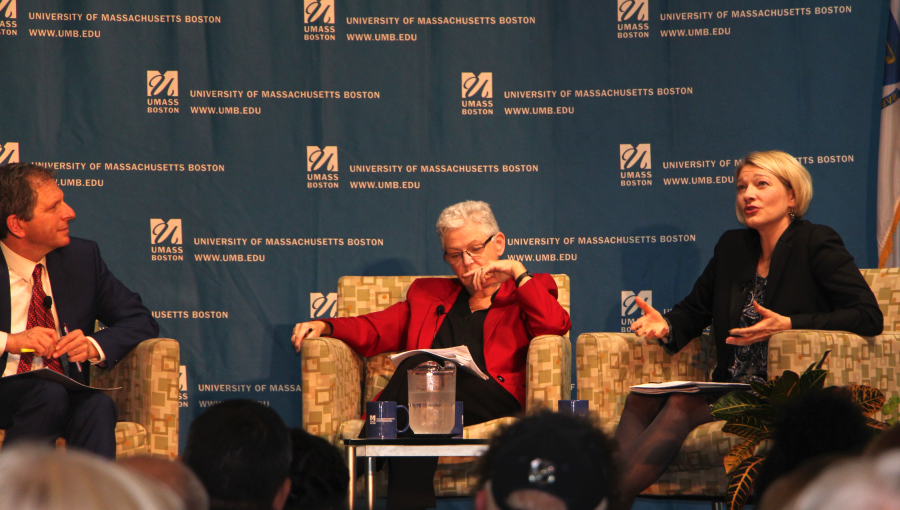The University of Massachusetts Boston and the John F. Kennedy Presidential Library and Museum collaborated on Oct. 30 to celebrate the centennial birthday of the late President John F. Kennedy with an appreciation of his accomplishments and how they apply today. The collaboration brought together former administrator of the United States Environmental Protection Agency (EPA), Gina McCarthy, and the CEO of Greentown Labs, Emily Reichert, to discuss the current and future effects of climate change.
The lecture opened with the Dean of the McCormack Graduate School and event moderator, David Cash, introducing Chancellor Barry Mills’ welcome address. Cash also introduced the Director of the Library Foundation, Steve Rothstein’s, clip of one of JFK’s famous speeches, and finally, the opening statement from President Kennedy’s grandson, Jack Kennedy Schlossberg. After Schlossberg’s speech on his grandfather’s legacy, Cash called up McCarthy, or, the “Beyoncé of Climate Change,” and Reichert, “a rock-star in her own right,” to fully start the event.
According to all panel speakers, climate change is the biggest problem of our day. McCarthy said it is the “greatest public health challenge we face. I just participated in a release of a Lancet-funded study that looks at pollution in the world today and it identified that one out of 16 premature deaths result from pollution exposure in the world today, it indicated nine million people, you know, have their lives prematurely cut.”
To help people understand this dilemma, McCarthy wants to bring climate change down to the personal level; stressing the importance of clean air and water, the future of the New England coastline, and the future of all American citizens. McCarthy also said, “Unfortunately, climate has become part of one party’s political agenda, and you have an administration that is frankly seeking more to divide us than to unite us.” That points to the significance of money and industry in this debate.
Clean technology is necessary to prevent climate change and according Reichert, it’s a continuously growing market. When asked about what the government should be doing to help the green-tech industry, Reichert said, “I think at the federal level, what would be helpful, is to give the signal, to markets and to the country in general, that we need to be moving forward in this direction.” McCarthy agreed by adding, “There is a clean energy transition underway, they were underpinning, you know, it wasn’t aggressively moving, it was following the way the energy system was working.”
Climate change is affecting the country, not only on the ecological scale, but in politics as well. McCarthy defended the strides the EPA has made: “We followed science and the law, and we brought everybody’s voice to the table. That’s how it works. I know there has been a lot of announcements on the things that are going away that we did; but I say good luck to them and if they can figure out how we failed, go for it. But I think that we did a damn good job, I think it’s going to be standing when the next administration comes in.”
Rothstein’s clip of Kennedy’s Moon Speech at Rice University showed that the Kennedy Administration’s stance on science was passionate and innovative, “We chose to go to the moon. We chose to go to the moon in this decade and do the other things, not because they are easy, but because they are hard, because that goal will serve to organize and measure the best of our energies and skills, because that challenge is one that we are willing to accept, one we are unwilling to postpone, and one which we intend to win, and the others, too. Clean energy is today’s moon shot.”

